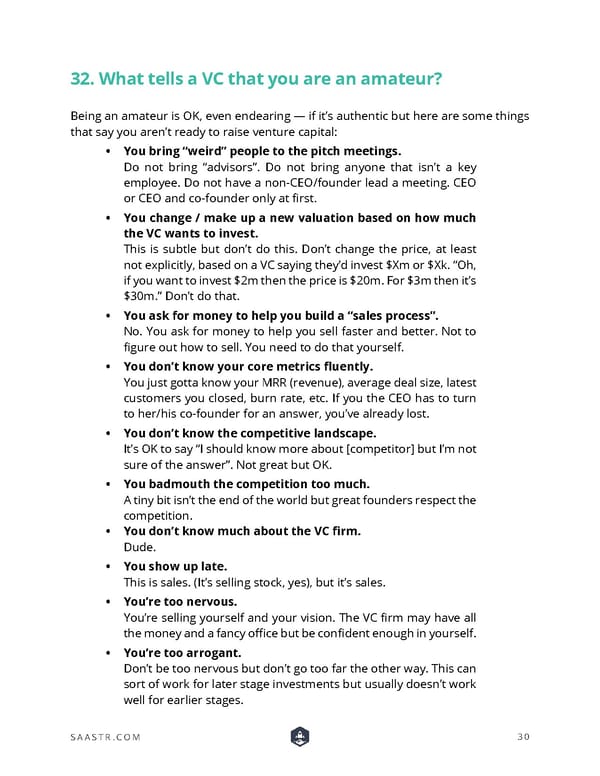32. What tells a VC that you are an amateur? Being an amateur is OK, even endearing — if it’s authentic but here are some things that say you aren’t ready to raise venture capital: • You bring “weird” people to the pitch meetings. Do not bring “advisors”. Do not bring anyone that isn’t a key employee. Do not have a non-CEO/founder lead a meeting. CEO or CEO and co-founder only at first. • You change / make up a new valuation based on how much the VC wants to invest. This is subtle but don’t do this. Don’t change the price, at least not explicitly, based on a VC saying they’d invest $Xm or $Xk. “Oh, if you want to invest $2m then the price is $20m. For $3m then it’s $30m.” Don’t do that. • You ask for money to help you build a “sales process”. No. You ask for money to help you sell faster and better. Not to figure out how to sell. You need to do that yourself. • You don’t know your core metrics fluently. You just gotta know your MRR (revenue), average deal size, latest customers you closed, burn rate, etc. If you the CEO has to turn to her/his co-founder for an answer, you’ve already lost. • You don’t know the competitive landscape. It’s OK to say “I should know more about [competitor] but I’m not sure of the answer”. Not great but OK. • You badmouth the competition too much. A tiny bit isn’t the end of the world but great founders respect the competition. • You don’t know much about the VC firm. Dude. • You show up late. This is sales. (It’s selling stock, yes), but it’s sales. • You’re too nervous. You’re selling yourself and your vision. The VC firm may have all the money and a fancy office but be confident enough in yourself. • You’re too arrogant. Don’t be too nervous but don’t go too far the other way. This can sort of work for later stage investments but usually doesn’t work well for earlier stages. SAASTR.COM 30
 The Ultimate Guide For Scaling Sales & Raising Capital Page 33 Page 35
The Ultimate Guide For Scaling Sales & Raising Capital Page 33 Page 35